HANOI, Vietnam (AP) — A prominent Vietnamese business tycoon was found guilty Monday of defrauding stockholders of nearly $150 million by falsely inflating the value of his company, in a case that comes as the government cracks down on widespread corruption in the country.
The Hanoi People’s Court sentenced Trinh Van Quyet, 48, to 21 years in prison after a two-week trial that included 49 defendants who were named as accomplices, state-run VN Express reported. It was not immediately clear whether Quyet, who was arrested in 2022, would appeal.
The billionaire was the chairman and founder of the FLC Group, which owns the discount Bamboo Airways and has broad real estate holdings including hotels, resorts and golf courses, among other assets.
According to the indictment, Quyet fraudulently inflated the value of the group's general contractor subsidiary, FLC Faros, by reporting fictitious capital contributions, before taking the company public in 2016.
In the initial public offering, the company sold some 391 million shares to about 30,000 investors, defrauding them of 3.6 trillion Vietnamese dong (about $144 million) according to the indictment. Quyet's co-defendants included multiple officials accused of being complicit in the scheme by approving and facilitating the initial public offering despite knowing of discrepancies in the figures.
All co-defendants were found guilty of various charges, with sentences ranging from probation to multiple years in prison.
Quyet's sisters Trinh Thi Minh Hue and Trinh Thi Thuy Nga were convicted on the same charges as him and were given sentences of 14 years and 8 years in prison respectively.
The former chairman of the Ho Chi Minh Stock Exchange, Tran Dac Sinh, deputy CEO Le Hai Tra, and former deputy CEO Tram Tuan Vu were all convicted of abuse of authority in enabling Quyet to inflate his company's value, and sentenced to 6.5 years, 5 years, and 5.5 years in prison respectively.
Quyet's arrest came as part of a crackdown on corruption instituted by Vietnamese authorities. The Communist Party’s Blazing Furnace campaign began in 2013, but it wasn’t until 2018 that authorities began scanning the private sector. Since then, several owners of Vietnam’s fast-growing businesses have been arrested.
The anti-corruption campaign had been the hallmark of Communist Party General Secretary Nguyen Phu Trong, Vietnam’s top politician. who died last month at age 80, three days before Quyet’s trial started.
The ideologue had called corruption a grave threat to the party and vowed that the campaign would be a “blazing furnace” where no one was untouchable.
In April, real estate tycoon Truong My Lan, was sentenced to death by a court in Ho Chi Minh City for orchestrating the country’s largest ever financial fraud case, was one of Vietnam’s most important businesspeople for years.
She has been convicted for fraud amounting to $12.5 billion — nearly 3% of the country’s 2022 GDP — and for illegally controlling a major bank and allowing loans that resulted in losses of $27 billion, state media outlets reported.
Since 2016, thousands of party officials were disciplined, including former presidents Nguyen Xuan Phuc and Vo Van Thuong and the former head of parliament, Vuong Dinh Hue.
In all, eight members of the powerful Politburo were ousted on corruption allegations, compared to none between 1986 and 2016.
Rising reported from Bangkok

Trinh Van Quyet, a prominent Vietnamese business tycoon, is escorted to a court for his trial of defrauding stockholders, in Hanoi, Vietnam, July 22, 2024. (AP Photo/Anh Tuc)

Trinh Van Quyet, a prominent Vietnamese business tycoon, is escorted to a court for his trial of defrauding stockholders, in Hanoi, Vietnam, July 22, 2024. (AP Photo/Anh Tuc)
HONG KONG (AP) — Asian stocks fell while European markets started the week higher on Monday after another rout hit Wall Street, as a highly anticipated U.S. job market update added to worries about the economy.
France’s CAC 40 rose 0.5% in early trading to 7,391.61, and Germany’s DAX was up 0.6% to 18,405.74. Britain’s FTSE 100 added 0.6% to 8,227.80. Futures for the S&P 500 climbed 0.6% and those for the Dow Jones Industrial Average were 0.4% higher.
The Nikkei 225 index was hovering around its lowest level in almost a month during morning trading, and it slipped 0.5% to close at 36,215.75. Japan's gross domestic product grew by an annualized 2.9% in the second quarter, according to revised data from the Cabinet Office released on Monday. This was below expectations.
“Any broader risk aversion may have an amplified effect on Japanese equities, with safe-haven flows potentially supporting the yen, which is looked upon as negative for the country’s exporters,” Yeap Jun Rong, market strategist at IG, said in a commentary.
The U.S. dollar was trading at less than 143 Japanese yen in Monday trading.
Stocks in Chinese markets also racked up losses after worse-than-expected inflation data disappointed investors. Data from the National Bureau of Statistics on Monday showed deflationary pressure continues to loom large, as the consumer price index grew by 0.6% year-on-year in August, while the producer price index, which measures costs for manufacturing, was down 1.8% compared to August last year.
Hong Kong’s Hang Seng index declined 1.4% to 17,196.96 and the Shanghai Composite index was down 1.1%, at 2,736.49.
Australia’s S&P/ASX 200 dipped 0.3% to 7,988.10. South Korea’s Kospi lost 0.3% to 2,535.93.
On Friday, the S&P 500 dropped 1.7% and ended at 5,408.42 to close out its worst week since March 2023. Broadcom, Nvidia and other tech companies drove the market lower amid ongoing concerns that their prices soared too high in the boom around artificial intelligence, and they dragged the Nasdaq composite down by a market-leading 2.6% to 16,690.83.
The Dow Jones Industrial Average dropped 1% to 40,345.41.
Sharp swings also hit the bond market, where Treasury yields tumbled, recovered and then fell again after the jobs report showed U.S. employers hired fewer workers in August than economists expected. It was billed as the most important jobs report of the year, and it showed a second-straight month where hiring came in below forecasts. It also followed recent reports showing weakness in manufacturing and other areas in the economy.
Such a softening of the job market is actually just what the Federal Reserve and its chair, Jerome Powell, have been trying to get in order to stifle high inflation, “but only to a certain extent and the data is now testing Chair Powell’s stated limits,” said Scott Wren, senior global market strategist at Wells Fargo Investment Institute.
The two-year Treasury yield initially fell as low as 3.64% after the release of the jobs report, before quickly climbing back above 3.76%. It then dropped back to 3.66% following Waller’s comments, down from 3.74% late Thursday.
In energy trading, benchmark U.S. crude rose 89 cents to $68.56 a barrel. Brent crude, the international standard, added 84 cents to $71.90 a barrel.
In currency trading, the U.S. dollar edged up to 143.36 Japanese yen from 142.27 yen. The euro cost $1.1049, down from $1.1083.
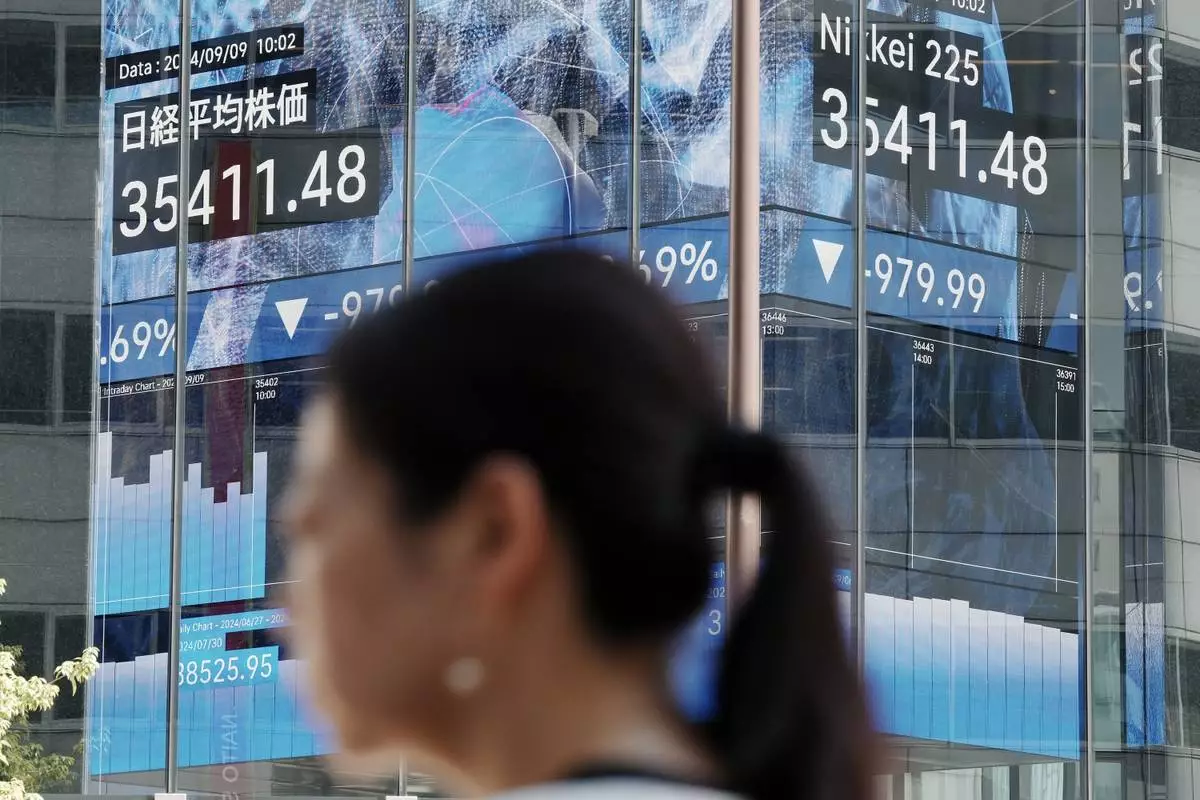
A person walks near an electronic stock board showing Japan's Nikkei index at a securities firm Monday, Sept. 9, 2024, in Tokyo. (AP Photo/Eugene Hoshiko)
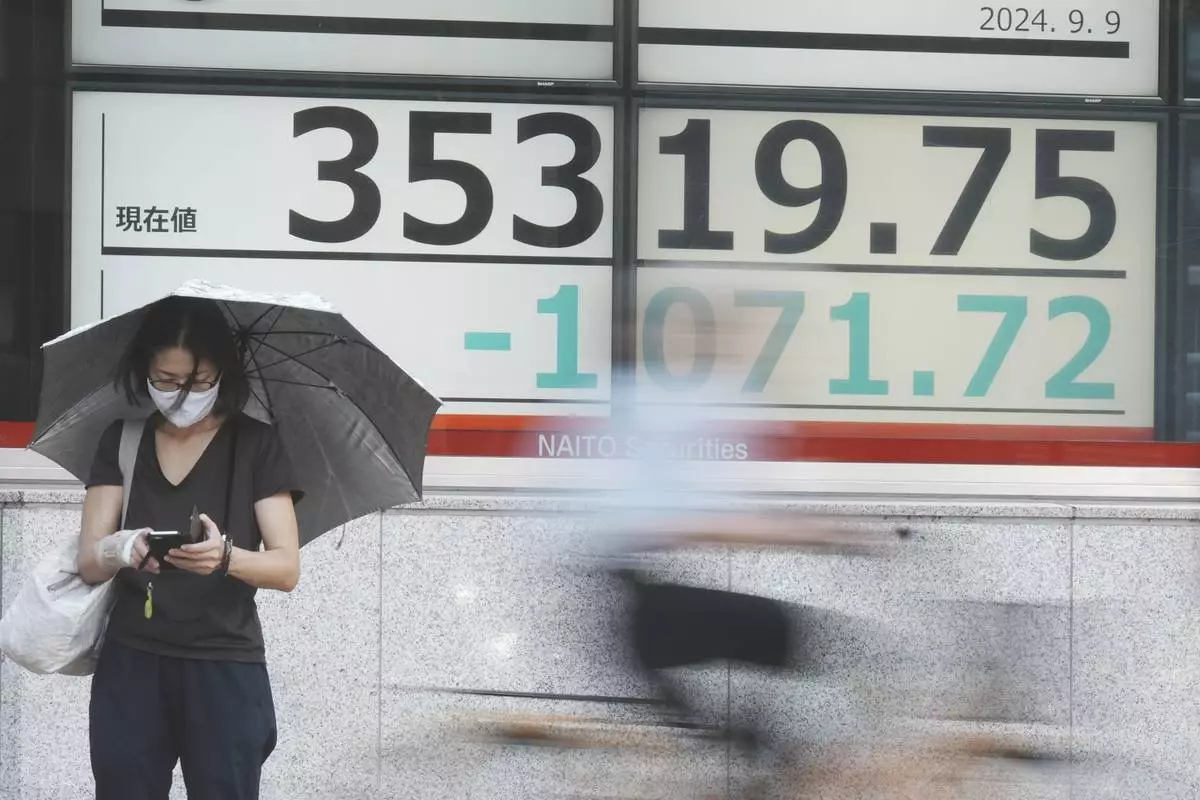
A person stands in front of an electronic stock board showing Japan's Nikkei index at a securities firm Monday, Sept. 9, 2024, in Tokyo. (AP Photo/Eugene Hoshiko)
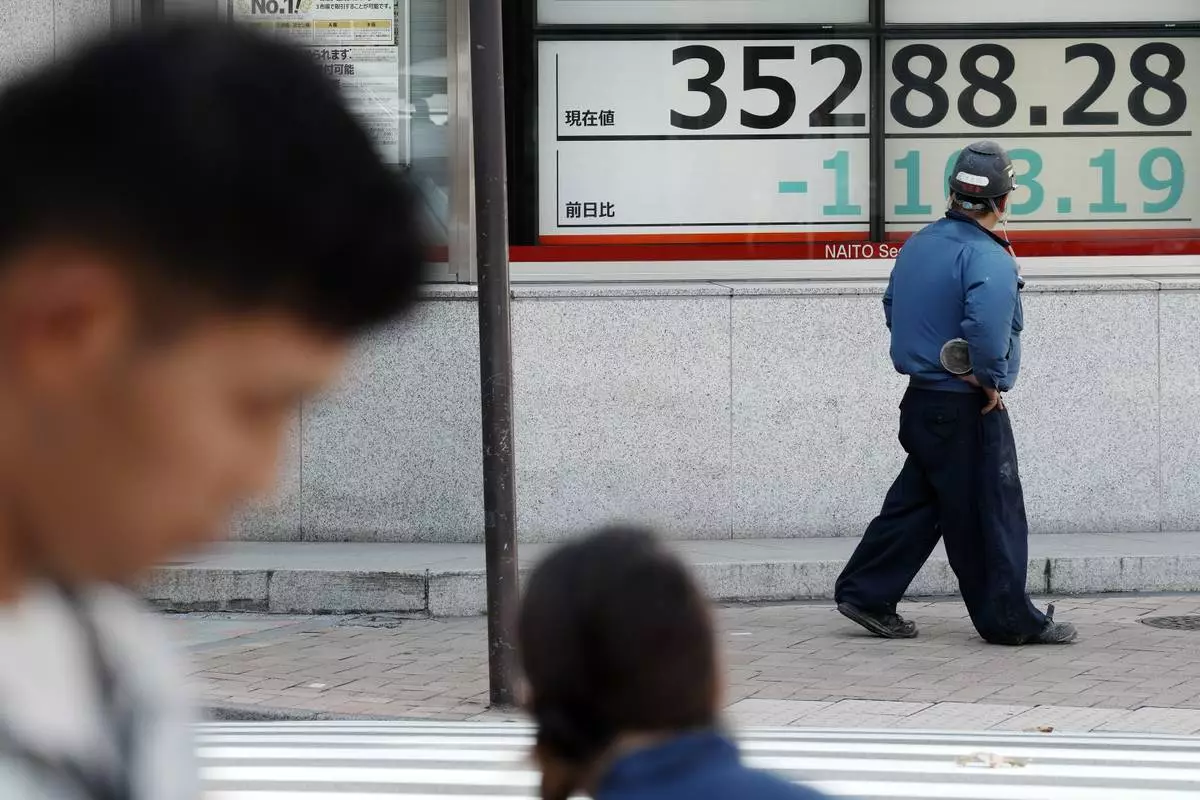
A person looks at an electronic stock board showing Japan's Nikkei index at a securities firm Monday, Sept. 9, 2024, in Tokyo. (AP Photo/Eugene Hoshiko)
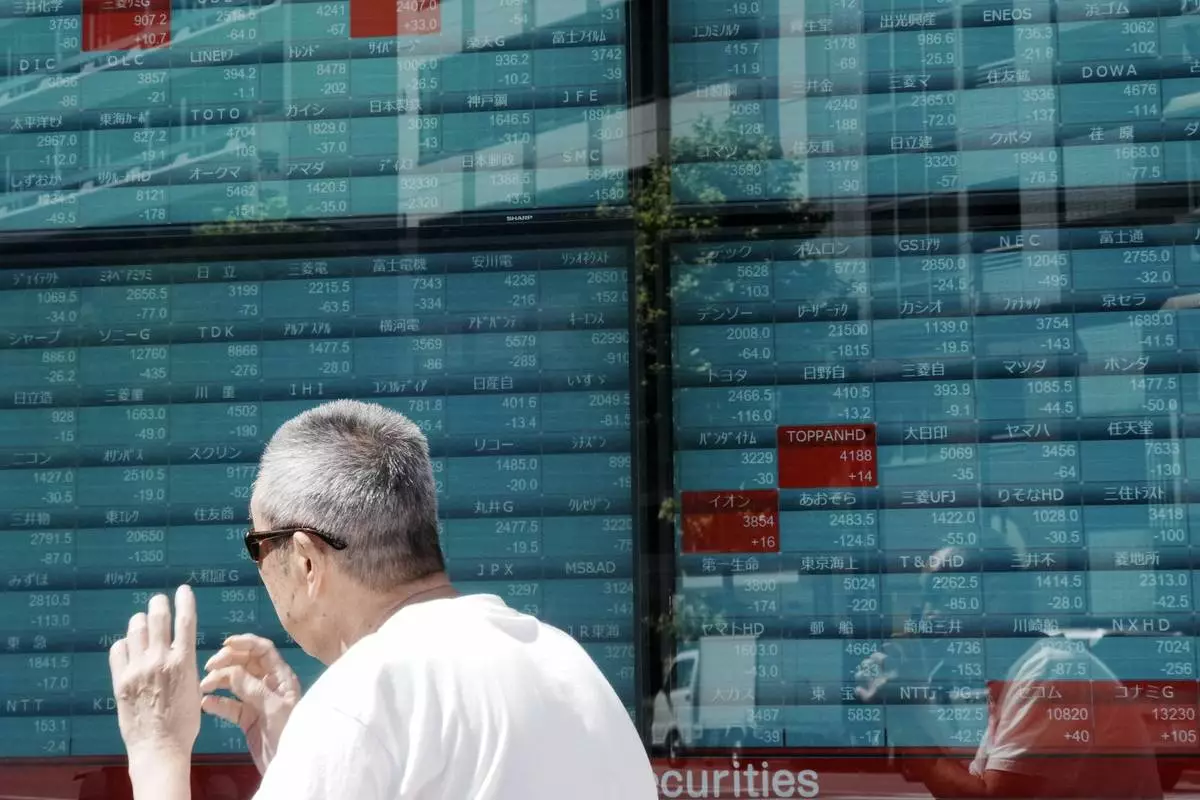
A person looks at an electronic stock board showing Japan's Nikkei index at a securities firm Monday, Sept. 9, 2024, in Tokyo. (AP Photo/Eugene Hoshiko)
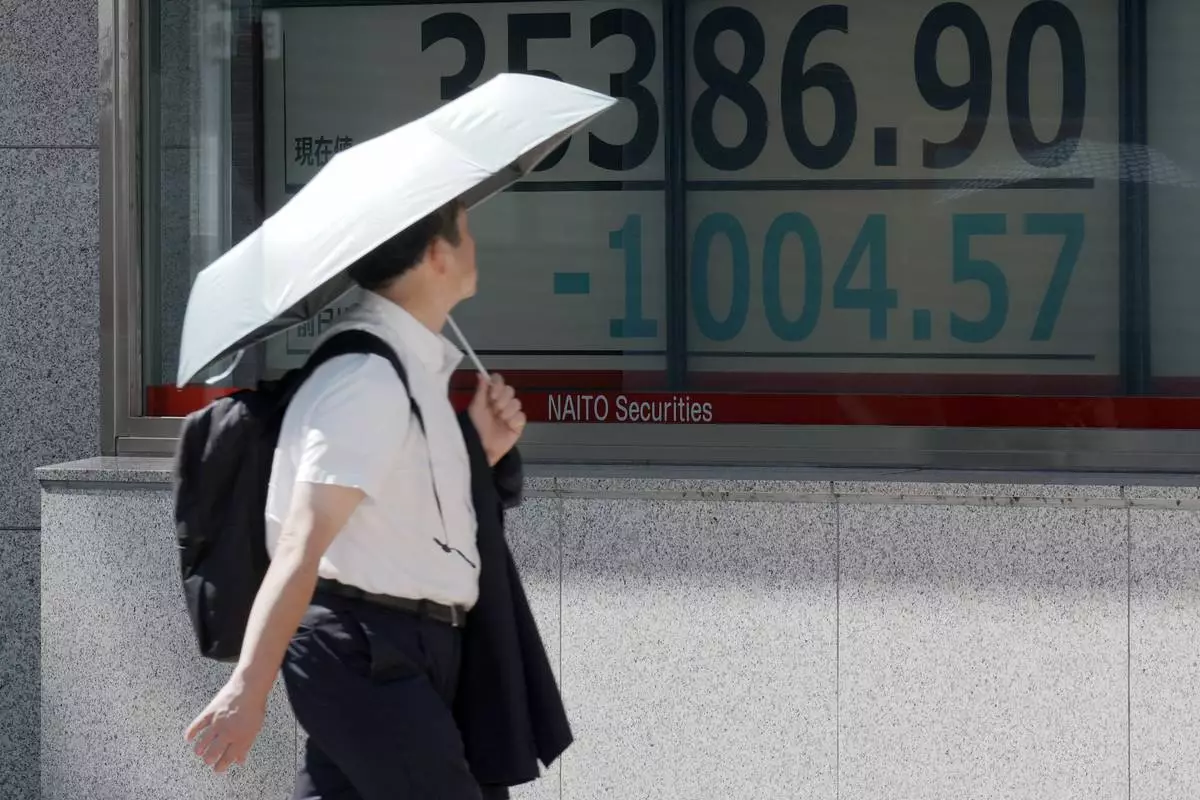
A person looks at an electronic stock board showing Japan's Nikkei index at a securities firm Monday, Sept. 9, 2024, in Tokyo. (AP Photo/Eugene Hoshiko)
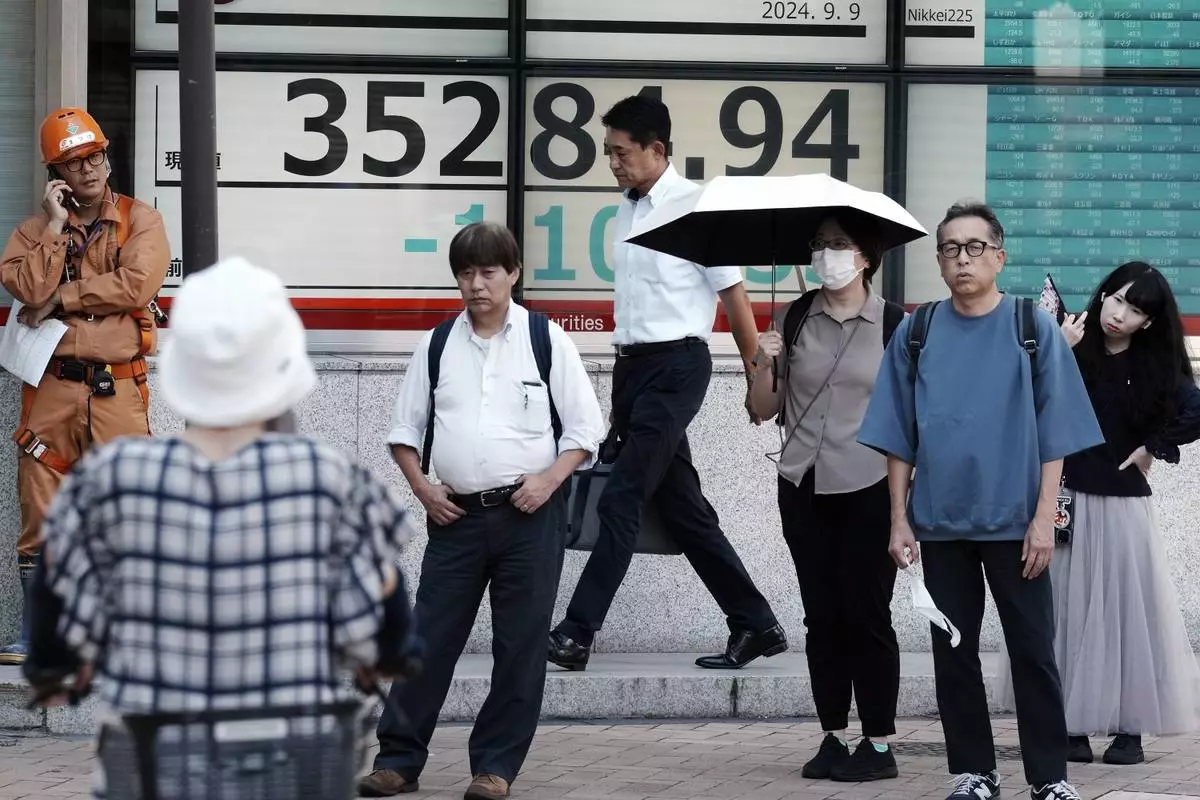
People stand near an electronic stock board showing Japan's Nikkei index at a securities firm Monday, Sept. 9, 2024, in Tokyo. (AP Photo/Eugene Hoshiko)

















